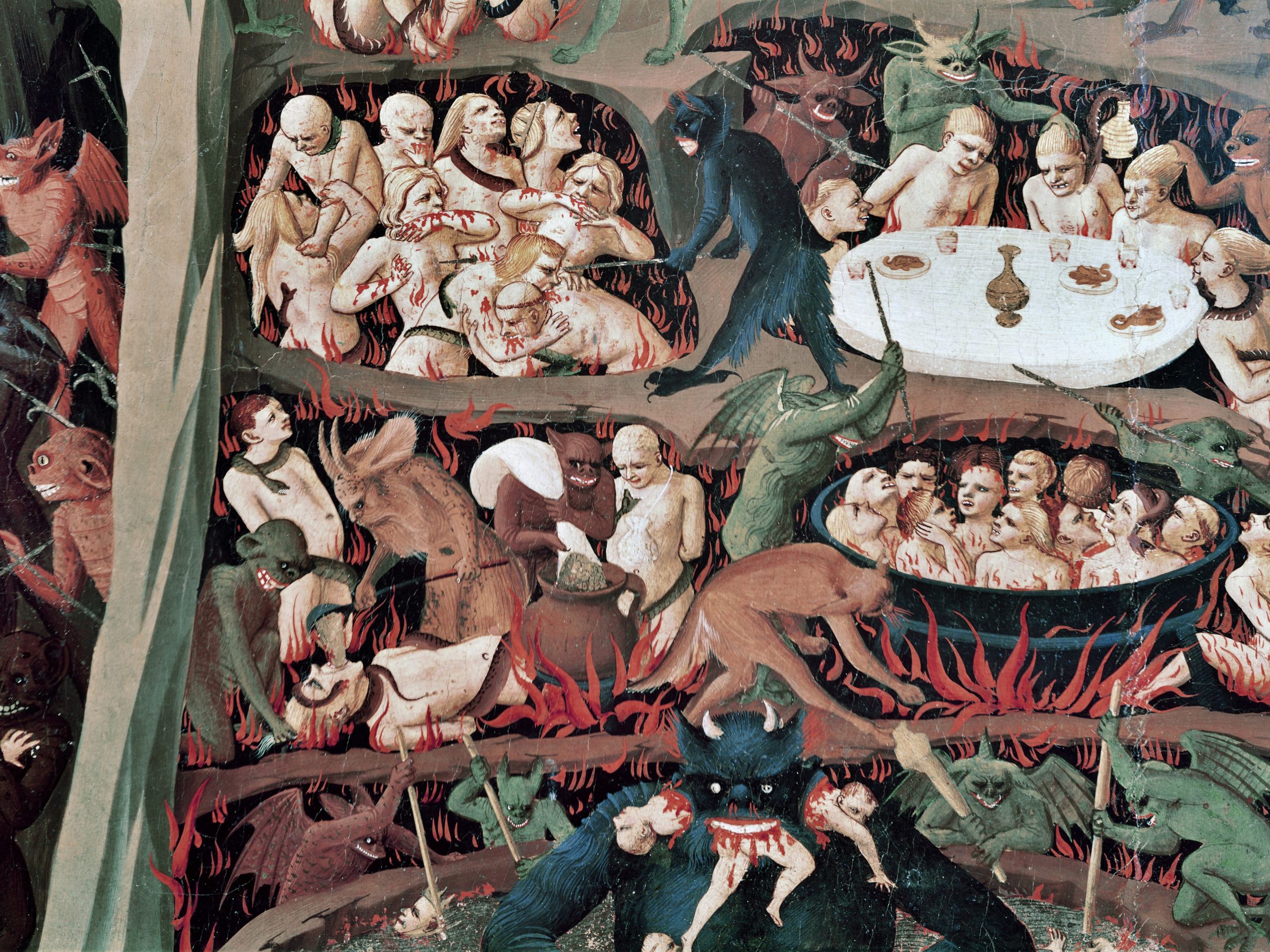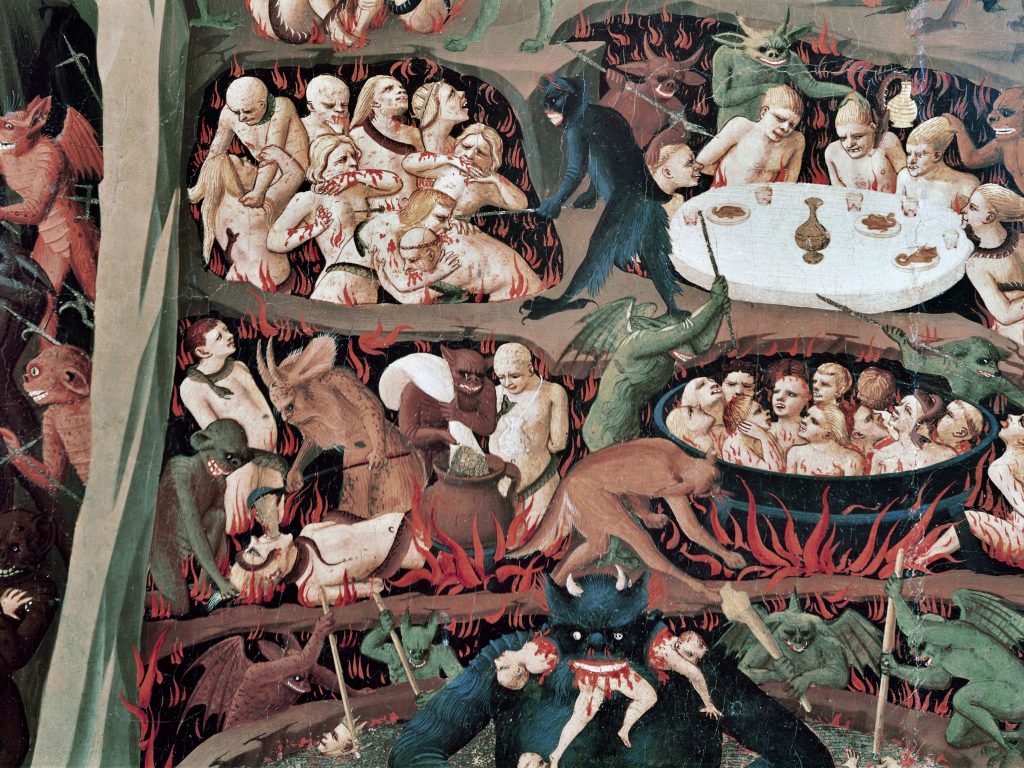Seven Deadly Sins and Their Punishments
Seven deadly sins and their punishments, or capital vices, are a grouping and classification of vices within Christian beliefs, even if they’re not referenced in the Bible itself. This category includes actions or habits that cause other immoralities to occur.
Pride, greed, wrath, envy, desire, gluttony, and sloth, according to the canonical list, are all antithetical to the seven heavenly virtues. The Desert Fathers, particularly Evagrius Ponticus, were the first to use this system, identifying seven or eight demonic thoughts or demons that needed to be vanquished.
Evagrius’ pupil John Cassian brought the classification to Europe with the publication of his book The Institutes, and it has since become central to the practice of catholic confession as documented in penitential manuals, sermons such as “The Parson’s Tale” from Chaucer, and artwork like Dante’s Purgatory, where the penitents of Mount Purgatory are grouped and punished by their worst sin.
For centuries, the Catholic Church taught its flock to avoid the most heinous of the seven deadly sins. Students were taught that pride and avarice, two of the most common sins, are the root causes of the rest of the devilish behavior.
There are several treatises and paintings and sculptures depicting the seven deadly sins in Catholic churches and older textbooks. There is a strong emphasis in Western Christian traditions on the seven deadly sins, as well as offenses against the Holy Spirit and sins that appeal to God’s wrath.
In this article, you will learn about the seven deadly sins and their punishments. Read on to know more.
Seven Deadly Sins and Their Punishments
1. Pride
Selfishness is dangerously corrupt selfishness that puts one’s interests and fancies above the well-being of others. Pride is dangerously corrupt selfishness. It’s sometimes referred to as the “gateway sin” because it opens the door to all the other vices. Moreover, it is the sin that isolates you from God’s grace (see: Lucifer), hence it is considered the worst of the worst.
You will be broken on the wheel as a result of your inflated ego.
2. Lust
Lust is the main topic of this article. Dante’s Inferno mentions Paolo and Francesca as being doomed for their infidelities. Desire (Latin for “carnal”) is lust or lechery (Latin for “intense craving”).
Passionate or unrestrained sexual desire might also lead to fornication, rape, obscenity, and other wicked and sexual activities; although, it could also signify other sorts of unbridled want, such as for money, or power. According to Henry Edward Manning, lust turns a person into “a slave of the devil.”
Lust, according to Dante, is an irrational attachment to individuals. Because it is an abuse of a faculty that humans share with animals, it is typically considered to be the least heinous capital sin.
The penitent in Dante’s Purgatorio travels through flames to rid his mind and heart of sexual thoughts and impulses. In Dante’s Inferno, the souls of those who have sinned against God are seen to be tossed about by a hurricane-like wind as a representation of their inability to control their carnal desires while on Earth.
3. Anger
Anger is, in fact, a negative emotion (even Jesus flipped tables). However, fury is sin whenever you feel overwhelming rage, hostility, or anger. Although “Wrath” ruins the mnemonic scheme, it is a necessary evil. PWGGLES? That’s of no use.
To the wrathful, the punishment of being dismembered “alive” (you’ll be in hell, so technically dead…) will infuriate them. To put it another way, you’ll be able to tell.
4. Greed
It is a sin of longing, like lust and gluttony, that manifests itself in the form of avarice (Latin: avaritia). In the Church’s view, however, greed is attributed to both an artificial, ravenous hunger and a desire for material goods.
Thomas Aquinas observed, “Greed is a sin against God, just as all mortal crimes, in that man condemns things eternal for the sake of transitory goods.” Those who have strayed too far from the path of virtue in Dante’s Purgatory are chained to the ground and forced to face the ground face down.
Hoarding, theft, and robbery can all be motivated by a person’s need for more, and these activities can be motivated by greed, as well. Among these wrongdoings is simony, the buying or sale of sacraments such as Holy Orders, and, as a result, positions of authority within the Church. It’s important to cite sources.
A man’s avarice, according to Henry Edward, “plunges him deep into the mud of this life, so that he considers it his god.”
Greed, as it is often understood outside of Christian scriptures, is a strong desire to accumulate more material wealth than one needs. It’s a dangerous path to take, much like pride.
5. Slot
The term “sloth” refers to a person’s habitual aversion to exertion. A scarcity of something rather than an excess of something distinguishes this sin from the others.
You’ll spend eternity in a snake-infested pit because of your laziness (a pit of sloths would be better).
Pope Gregory, I would be pleased for you if you kept your PAGGLES in check as a result of the Seven Deadly Sins. A glutton for punishment may not be the best approach.
Additionally, Stafford’s presentation on the Seven Deadly Sins of Crisis Communication was recently given by Stafford at the recent Baton Rouge and Shreveport Rotary Clubs, and she will be speaking at the DRI Annual Meeting in New Orleans from Oct. 16-19. Those who missed Stafford’s presentation can catch her there.
So, get a lawyer and learn how to defend oneself in the event of an accident or other unforeseen event.
6. Envy
In the same way that greed and lust are characteristics of enmity (invidia), so is envy. This kind of covetousness is often characterized by feelings of sadness or resentment toward the traits or things of others. It is born out of conceit and separates a person from his or her fellow man.
Dissatisfaction with someone’s traits, status, abilities, or rewards is shared by malicious envy and jealousy.
The envious, on the other hand, seek and covet the object of their wrath. It’s possible that “Neither shall you desire… anything that belongs to your neighbor”—a remark that may be related to greed—is a direct link between envy and one of the Ten Commandments.
According to Dante, envy is “the desire to rob other men of their own” and is characterized as such. For their immoral pleasure in seeing others’ misery, the envious suffer the punishment of their eyes being sewed shut with wire in Dante’s Purgatory.
As outlined by St. Thomas Aquinas, the struggle sparked by envy goes through three stages: attempting to lower another’s reputation in the first stage; receiving “joy at another’s a misfortune” or “grief at another’s prosperity” (depending on whether he succeeds in defaming the other person) in the middle stage; finally, developing hatred because “sorrow causes hatred.”
Cain is reported to have murdered his brother Abel out of jealousy because he thought God had preferred Abel’s offering to Cain’s.
According to Bertrand Russell, one of the most powerful causes of sadness is envy, which brings misery to those who harbor it while fueling their desire to cause harm to others.
Only pride, according to the most frequently accepted viewpoints, is more harmful to the soul than envy. Envy, like pride, has long been linked to the devil, as Wisdom 2:24 states: “the envy of the devil caused harm to the earth.
7. Gluttony
When you overeat and overindulge, you’re guilty of gluttony. It’s often connected to food. St. Thomas Aquinas went a step further in his judgment of gluttony by breaking down the numerous ways in which it can be committed.
Are you a fan of high-priced cuisine? Glutton. Does eating bring you joy? Glutton. Are others experiencing a similar attack? You’ll have to eat rats, spiders, and toads as part of your horrible torment. Pass.
Conclusion
If you believe in Christianity, you may have heard of the term “capital vice,” which is a term used to describe a set of moral failings that aren’t specifically mentioned in the Bible but that are nonetheless considered grave by Christians. Things that lead to further immoralities fall into this category.


